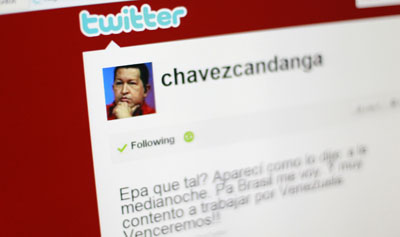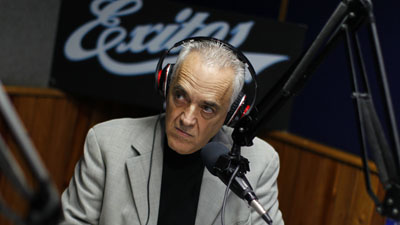The mysterious group N33 has targeted the online accounts of journalists critical of the Chávez administration. The victims are subject to fake messages, insults, and intimidating threats. By John Otis

Published August 29, 2012
CARACAS
The use of social media is rising around the world, but as government restrictions on traditional Venezuelan media tighten, professional journalists and citizen reporters are increasingly turning to social media, especially Twitter, to transmit and track the news. Venezuela has about 2 million Twitter users, or about 8 percent of the population. That gives Venezuela the highest Twitter penetration in the region after Uruguay, according to research by the local research company Tendencias Digitales.
More in this report
• Introduction: Media transformed
• Press under assault
• State media target critics
• Globovisión harassed
Audio report
• Media under seige
In print
• Download the pdf
In other languages
• Español
“The government tries to silence bad news, and that’s why social networks are now playing a big role,” Luisa Torrealba, coordinator of the Venezuelan branch of the Institute for Press and Society, told CPJ. “They are an escape valve to allow people to learn what’s going on.” Or, as Miguel Henrique Otero, editor of the Caracas daily El Nacional, told CPJ: “With so much self-censorship in Venezuela, Twitter represents freedom of expression.” Often, Venezuelans pass on information and learn about events, such as power outages and oil spills that the government is not eager to publicize, through Twitter, Facebook posts, and blogs.
But the government is also using social media to promote its agenda and to attack its critics. President Hugo Chávez Frías’ Twitter account now has more than 3 million followers, while his ministers regularly announce new measures via Twitter. More ominously, prominent journalists and opinion leaders have had their Twitter accounts hacked, in many cases by a mysterious pro-government group called N33.
In 2011, the independent freedom of expression group Espacio Público documented 30 cases of hacking against journalists, writers, human rights activists, and opposition politicians. The organization reported at least another 14 cases this year. In a few cases, government or pro-government figures have been targeted. The email account of Vice President Elías Jaua was violated on February 9, 2012, with the hackers sending fake messages.
In a September 2, 2011, communiqué, N33 said it had formed to wage cyberattacks against the “irresponsible and ignorant” critics of President Chávez. The group hacks into Twitter accounts, then uses them to transmit pro-government messages or insults. N33 took credit for hacking the Twitter accounts of Ibéyise Pacheco, a prominent opposition journalist, and writer Leonardo Padrón.

Another hacking victim was Nelson Bocaranda, a widely read gossip columnist for the Caracas daily El Universal who has nearly 700,000 Twitter followers. According to Torrealba, Bocaranda may have been targeted because amid a news blackout by the government, he was the first journalist to report that Chávez was suffering from cancer.
Luis Carlos Díaz, an independent journalist and blogger, told CPJ that N33 had hacked his Twitter account several times over the past year. “The attacks online can be vicious,” said Díaz, who also runs workshops to teach journalists how to protect their online accounts from hackers. “We see statements saying that critics of Chávez … are cockroaches, the enemy, and that they need to disappear or leave the country.”
The hacking goes beyond fake messages and insults. Hackers logged into Twitter can access account profiles, which reveal the true owners’ email addresses, as well as the contents of private direct messages. Thus N33 or other hackers can often gain access to personal information and other details.
“Because they also get into your email, they can get your contacts, learn your home address and telephone numbers, learn the number of children you have, or the numbers of your bank accounts,” Erika Rosales, who tracks hacking cases for Espacio Público, told CPJ. “It is a way to sow fear. It’s a way for the government to say, ‘Don’t do this because we can punish you. And if you keep doing it, it’s going to get worse.’” She said that after having their Twitter accounts hacked in September 2011, Padrón and Berenice Gómez, a Caracas journalist, received threatening phone calls from people identifying themselves as members of N33.
Díaz believes N33 gains access to personal online accounts through collaboration with Venezuela’s main government-run Internet service provider CANTV. N33 has denied any ties to the government. But its actions are often publicized on “La Hojilla” (The Razor), a state-run TV late-night program that regularly lambastes journalists critical of the Chávez government. Neither CANTV nor the Ministry of Science, Technology, and Innovation responded to CPJ email and phone requests for comment.
Otero told CPJ that after his journalist wife’s Twitter account was hacked, friendly government sources assisted him in carrying out his own investigation. Otero said his information indicated the hackers were working from the Caracas office of the national intelligence service, known as SEBIN. Neither SEBIN nor the Ministry of Justice and the Interior responded to CPJ email and phone requests for comment.
Hacking is illegal under Venezuela’s Special Law against Internet Crimes. If convicted, violators face stiff fines and up to six years behind bars. Although Gómez, Padrón, and other hacking victims have denounced the violations before the Attorney General’s Office, the investigations have gone nowhere and there have been no convictions, according to Marianela Balbi, executive director of the Institute for Press and Society. Gómez and Padrón both confirmed to CPJ that their legal cases have gone nowhere. These high levels of impunity, said Rosales of Espacio Público, “make people take the [threatening phone calls] very seriously.” Espacio Público has published an online guide to help Internet users protect themselves from hackers.
Carlos Correa, director of Espacio Público, told CPJ, “The problem here is that government critics have very little protection. The justice system is not considered independent and has yet to respond vigorously to complaints of people who have had their accounts hacked or their websites taken down or have been defamed or threatened publicly.”
Julio Rafael Chávez Meléndez, a representative of the National Assembly and vice chairman of its Commission on Media and People’s Power, told CPJ that allegations of hackers going after independent voices were overblown. He shrugged off the accusations as the opposition’s “resistance to the free flow of ideas.” He said authorities have yet to receive evidence that N33 has hacked accounts but that “we would prosecute such crimes if the evidence was there.”
John Otis, CPJ’s Andes correspondent for the Americas program, works as a correspondent for Time magazine and the Global Post. He authored the 2010 book Law of the Jungle, about U.S. military contractors kidnapped by Colombian rebels, and is based in Bogotá, Colombia.
